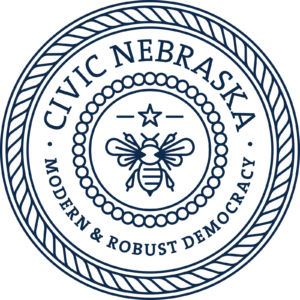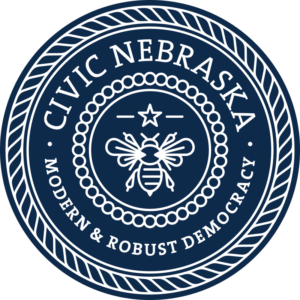If the past few weeks are any indication, by the time Nov. 5 rolls around the 2024 election will end up being the noisiest and most angst-ridden campaign in modern history. There are many reasons for this, of course, but in our estimation, the main driver is the almost unimaginable amount of money being poured into our political processes to enrage, inflame, and divide us.
This might not be done in direct support of one particular candidate or political party, necessarily, but the results are usually the same. When Americans are relentlessly bombarded with divisive messaging, eventually they do one of two things – they either get sucked into the conflict, usually to an unhealthy degree; or, to protect their sanity, they check out and stop participating in our shared democratic reality.
Neither is good for our country. Of course, U.S. politics are not for the squeamish. They are not designed for frequent kumbaya breaks and naive reminders that we’re “all in this together.” But we’d be lying if we hadn’t noticed an even more acute shift in 2024 – away from a competitive, perhaps even heated competition of ideas and even further toward the apocalyptic “Us-vs.-Them” narrative.
In 2021, we published a short paperback titled Reclaiming We. It was designed to be a pocket guide of everyday acts every individual American could take to strengthen the common good (and therefore, defend democracy). We wrote it with a collective return to sober and rational self-government in mind, and as a reminder that ultimately, it’s not party leaders or presidents who are responsible for making our nation a better place to live work, play, and thrive. It’s up to us. At the end of the day, while our chattering political classes will continue making noise from inside the Beltway as if they speak for all Americans, the 340 million of us who live here must settle on how to coexist despite our differences.
Combative, divisive politics are en vogue right now, but here’s the surest thing we know: Eventually, this leads to mutually assured destruction – guaranteed. If we were writing a follow-up to Reclaiming We today, we could add several new everyday acts to help bring the “Us-vs-Them” virus to heel. Here are but 10.
1. Stay cool.
Because, mainly, cooler heads tend to prevail. Honestly, in an election year, we all should be arguing right now about the best path forward for our country, and which candidates can best get us there. Notice we say arguing, not fighting. America has been fighting too much lately, figuratively and literally. The commitment to civil discourse and measured rhetoric starts with our elected officials – national, state, and local – as well as our major news media. Each has a special responsibility to model how to debate ideas, not tear people down for sport. And we everyday citizens have a responsibility to amplify productive, thoughtful debate when we see it, not just forwarding memes and stories about our political opponents getting dunked on.
2. Get media-savvy.
Speaking of media: In case you haven’t noticed yet, political media is noisy. The volume is sometimes so frenetic and confusing that it can be impossible to spot the signal amid all of it. In an election year – especially in an election year – we Americans must be vigilant in spotting agenda-driven news content, take it for what it is, and treat it accordingly. The same goes for news content that brings new information to the fore and challenges us to think critically. It’s beyond cliche to implore our fellow Americans to better consider what we read, watch, and hear, but in the age of disinformation, bot farms, and weaponized AI, we have to be skeptical about any campaign headline that comes down the pike, not just the ones we disagree with.
3. Work together.
Believe it or not, social media is not the real world and Americans coast-to-coast are more alike than they are different. Because of this rock-solid fact, there are still many entry points for projects and policies that require bipartisan and nonpartisan collaboration at the federal, state, and local levels. Find them, learn about them, and support them. Further, let’s be sure to give props to politicians who work across the aisle to get things done. It used to be a noble thing in America to work with people in the “other” party, and it’s something we must return to if we are to sustain our American experiment.
4. Lean into civic education and engagement.
Americans as a whole have a civics deficiency. In election years, the hole is particularly glaring. Our Constitution wasn’t intended to be weaponized; our president was never supposed to be above the law; our voting rights were not earned so we could casually dismiss them. Together, we can push for more – and better – civic education in our community’s schools so every young person understands how our democratic republic works, where we’ve been as a nation, and what is yet possible. Adults, especially adults who have a distaste for partisan politics, can join and look for local forums or town halls to discuss relevant issues without the party labels. In the words of Thomas Jefferson: “A well-informed citizenry is the best defense against tyranny.”
5. Seek common goals.
There’s a lot of money to be made in keeping Americans divided. But yet, we all live here, on the North American continent in 2024 AD, and we will continue to live together after Nov. 5. There are so many problems that affect everyone – healthcare, education, infrastructure – that are waiting to be seriously addressed, yet so much time, attention, and worry is placed on narrow wedge issues that affect far fewer people and groups but fire up the Reddest of the Red or the Bluest of the Blue. We can start to reject reflexive polarization by getting involved in local projects that bring people together (neighborhood associations are a great place to begin). Then, from there, we can build upward, together.
6. Support fixes to our systems.
This one could be a post of its own, but needless to say, many of our election structures are overdue for structural reform. We’re not talking about baseless accusations of “voter fraud” and other toxic conspiracy theories; we mean systemic change in how we select our leaders and forge our national, state, and local priorities. At the state level, open primaries would be one way to turn down the heat, keep silly season at bay, and allow voters to pick their best candidate for the job at hand. Primary candidates currently have to pander to their parties’ extremes, which results in general election matchups of radically different visions of our society. Also: If the 2024 election season doesn’t convince a plurality of Americans that campaign finance reform is long overdue, we’re not sure what will. Politicians must be accountable to the people, not corporations and other big-money donors. Entrenched interests don’t hand over power willingly; we must be vigilant in pushing for systemic reforms that put the power and influence back where it belongs.
7. Practice empathy.
It may sound simple, even cliché. But we do best as a nation when we remember that our political opponents are people, too. The vast majority have real concerns and wish to be seen and heard. This is hard and can assault our sensibilities, but it is necessary in a free country. This doesn’t mean inviting a white supremacist over for dinner for a friendly chat – but it does mean that we all get a little closer to understanding and empathy if we listen to personal stories from different communities, in whatever format. In Omaha, Rick Galusha moderates the Free Speech Society. In Lincoln, Jason Christianson moderates All Politics Is Local, where all views are welcomed and empathy overwhelmingly wins over anger and mutual attacks. Find these and other entry points to bring others into three dimensions rather than abstract “enemies.”
8. Don’t isolate.
In 2024, fear has emerged as a common thread among voters, regardless of political persuasion. Much of it is the result of being in our bubbles, doomscrolling, and limiting our engagement with others. Social media is a petri dish of anxiety, as are the 24/7/365 cable TV news networks and online media; their collective motto might as well be STAY SCARED!. But as we have said: In a world of perpetual fear, the definition of we is so very narrow. Action drives out fear, so we would do well to get out of the house and get involved – whether with community events that mix different groups, like service projects and cultural festivals, or in social spaces that more easily allow you to meet, build relationships with, and collaborate with people from different backgrounds and who may have different beliefs than yours. Trust is contagious; we just need more of it.
9. Tackle inequality.
The last time the United States was this divided was The Gilded Age (1865-1902), which featured similar social, technological, economic, and demographic changes to what we’re going through today. That era gave way to the Progressive Era, a time of widespread social activism and political reform across the country. We can and should push for, and relentlessly support, policies and proposals that address income inequality to give everyone a fair shot. At Civic Nebraska we believe a truly representative democracy is realized only when all voices are genuinely heard, and the path forward is built on a strong education system, a compassionate approach to health care, and an inclusive economy that leaves no one behind. If those ideals are realized, there would be little worry about punitive, reactionary measures like the new ID mandate in Nebraska to vote. As is, it creates unnecessary barriers for underresourced and underrepresented Americans to fully exercise their most precious Constitutional rights – and deepens inequality.
10. Demand accountability.
Call out politicians, commentators, and pundits who deal exclusively in divisive rhetoric. We must consistently remind our fellow Americans that scorched-earth politics are a dead end, and encourage everyone to support a politics that lifts up rather than tears down – and to call out the arsonists when appropriate. This doesn’t mean there’s no room for criticism and spirited debate between candidates and their supporters; but after all is said and done, one thing is true above all: Us-vs-Them politics takes a toll on us all. All of us are affected, and we all carry the scars and burdens of shattered relationships and the death of discourse, regardless of who wins in November.
We can do better. We have to do better. So, shall we?



